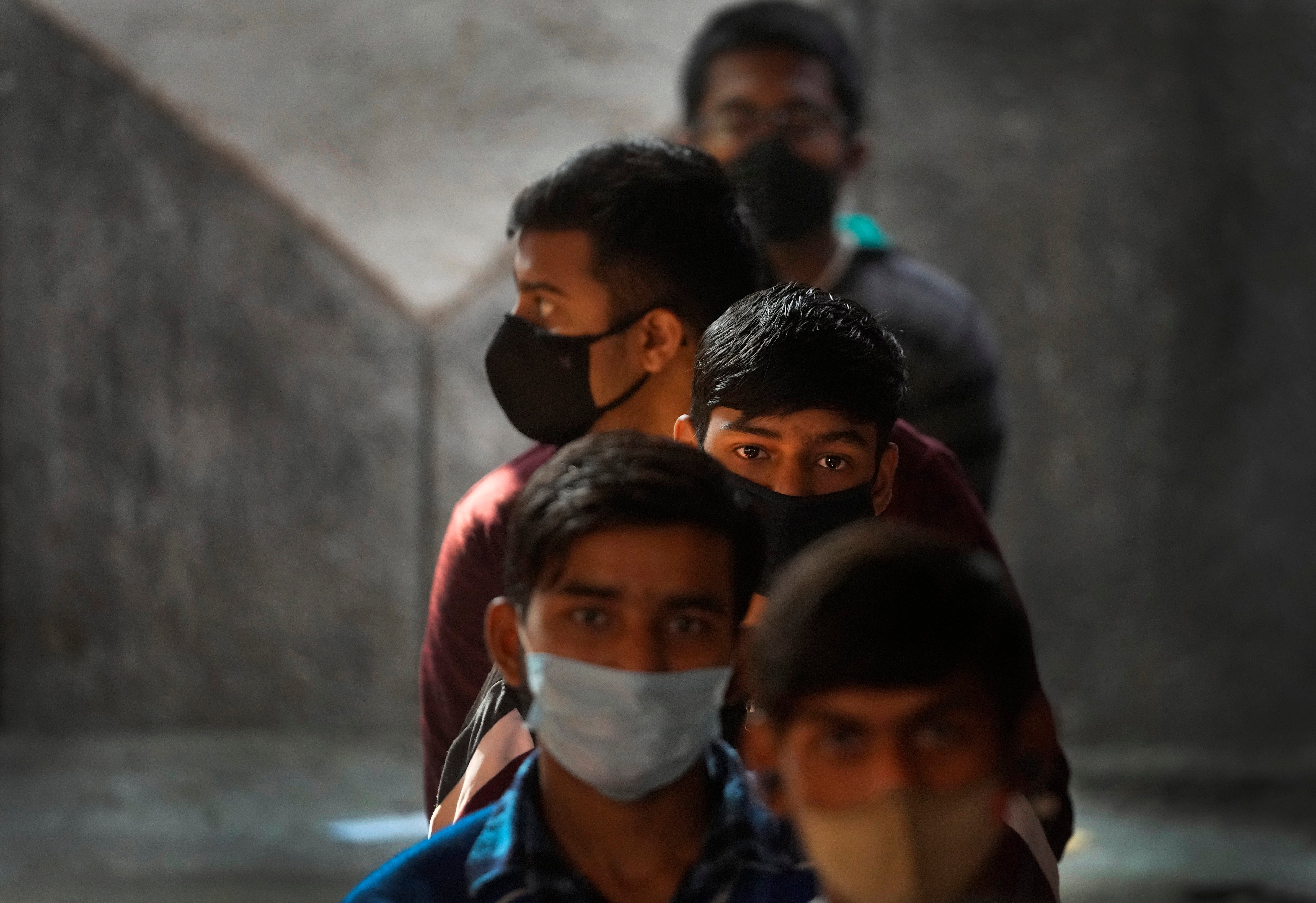India opens vaccination for teens aged 15 to 18 as Covid cases rise
India has begun vaccinating teens in the age group of 15 to 18, as more states are enforcing tighter restrictions to arrest a surge of infections stoked by the omicron variant

Your support helps us to tell the story
From reproductive rights to climate change to Big Tech, The Independent is on the ground when the story is developing. Whether it's investigating the financials of Elon Musk's pro-Trump PAC or producing our latest documentary, 'The A Word', which shines a light on the American women fighting for reproductive rights, we know how important it is to parse out the facts from the messaging.
At such a critical moment in US history, we need reporters on the ground. Your donation allows us to keep sending journalists to speak to both sides of the story.
The Independent is trusted by Americans across the entire political spectrum. And unlike many other quality news outlets, we choose not to lock Americans out of our reporting and analysis with paywalls. We believe quality journalism should be available to everyone, paid for by those who can afford it.
Your support makes all the difference.Indian health authorities Monday began vaccinating teens in the age group of 15 to 18, as more states started to enforce tighter restrictions to arrest a new surge stoked by the infectious omicron variant.
State governments across India administered doses at schools, hospitals and through special vaccination sites amid a rapid rise in coronavirus infections, particularly in the country’s densely populated cities.
Data from the health ministry showed India confirmed over 33,000 new COVID-19 cases in the last 24 hours. Deaths increased by 123, bringing the total to nearly 482,000.
Authorities are saying that even as cases have started to rise rapidly, hospitalizations have not gone up.
“There is no need to panic,” Arvind Kejriwal the chief minister of Delhi, said Sunday.
India has so far recorded almost 35 million COVID-19 infections.
The current surge in cases, including those of the omicron variant, is largely concentrated in India’s big cities like Delhi and the financial capital Mumbai The country has reported more than 1,700 omicron cases, with the highest number of infections in the western state of Maharashtra.
Many states have imposed new restrictions, including night curfews, limiting seating in bars and restaurants, and banning large public gatherings. The latest to enforce such restrictions was the state of West Bengal where authorities Sunday closed all schools and colleges.
The new surge prompted the country’s health minister, Mansukh Mandaviya, on Sunday to urge states to speedily ramp up medical infrastructure.
To bolster the public health system, including adding beds in intensive care units, Indian lawmakers approved a $3.1 billion financial package in August. But less than 17% of those funds have been utilized so far, the health minister said.
India experienced a devastating surge of infections in April and May last year when more than 400,000 cases were recorded daily at the peak of the crisis. That surge was mainly driven by the delta variant and overwhelmed the country’s healthcare system as hospitals ran out of beds and medical oxygen.
Health experts say the country is unlikely to witness last year's harrowing scenes this time because of a more vaccinated population but warn the surge in cases due to the highly transmissible omicron variant could once again strain the health system.
Vineeta Bal, a doctor who studies immune systems at the Indian Institute of Science Education and Research in the city of Pune, said vaccinating those under the age of 18 was important inoculating teens could reduce transmission, and help protect adults, including those who had other diseases that made them vulnerable to the virus.
“In the omicron context, this is more important because it is so transmissible,” said Bal.
India has so far partially vaccinated almost 90% of its eligible population and nearly 64% have received both doses. The government is yet to decide on offering booster shots for adults.
Health experts are, however, worried as India’s Election Commission last week allowed legislative elections early this year to go ahead as planned in Uttar Pradesh state, the country’s most populous with over 200 million people, raising fears that the infections could spread unchecked.
In recent weeks, political leaders including Prime Minister Narendra Modi have visited the state, leading rallies and delivering speeches to packed crowds. The photos have intensified concerns, bringing back memories of the last year’s surge, as political parties led mass rallies as infections soared throughout the country.
Bal, the health expert, said large crowds represented a heightened risk, with the virus still out there.
“I am extremely worried about a repeat of last year,” she said.



